News Round-Up: British PM Rishi Sunak Delays Some “Green Deal” Initiatives, Millions Given to Fight 'Misinformation' and Knowledge Helps with Climate Anxiety
Every week, the editorial team of Freedom Research compiles a round-up of news that caught our eye, or what felt like under-reported aspects of news deserving more attention.
Over the past week, the following topics attracted our attention:
British Prime Minister Rishi Sunak has softened the country's green policy and promised to refrain from coercion.
A British parliamentary committee presses video sharing platform Rumble to demonetize Russell Brand.
The US government is allocating millions to fight "misinformation".
Study: knowledge reduces climate change anxiety.
Rupert Murdoch warns against censorship.
UK Prime Minister Rishi Sunak relaxes country's green policy and vows to avoid coercion
British Prime Minister Rishi Sunak gave a speech on Wednesday in which he announced a moratorium on several green policies, the BBC reports. The government's plan to phase out the sale of new diesel and petrol cars in the UK by 2030 has now been pushed back five years to 2035. According to Sunak, diesel and petrol cars can continue to be driven and bought and sold second hand after the deadline. He said that Germany, France, and Spain are also taking a similar approach. The policy change is due to the need to give people time to make the switch to electric cars – which are also more expensive, Sunak said. "It should be you the consumer that makes that choice, not government forcing you to do it," he added. Sunak hoped, however, that as production costs fall and charging infrastructure grows, the majority of cars sold will be electric by 2030.
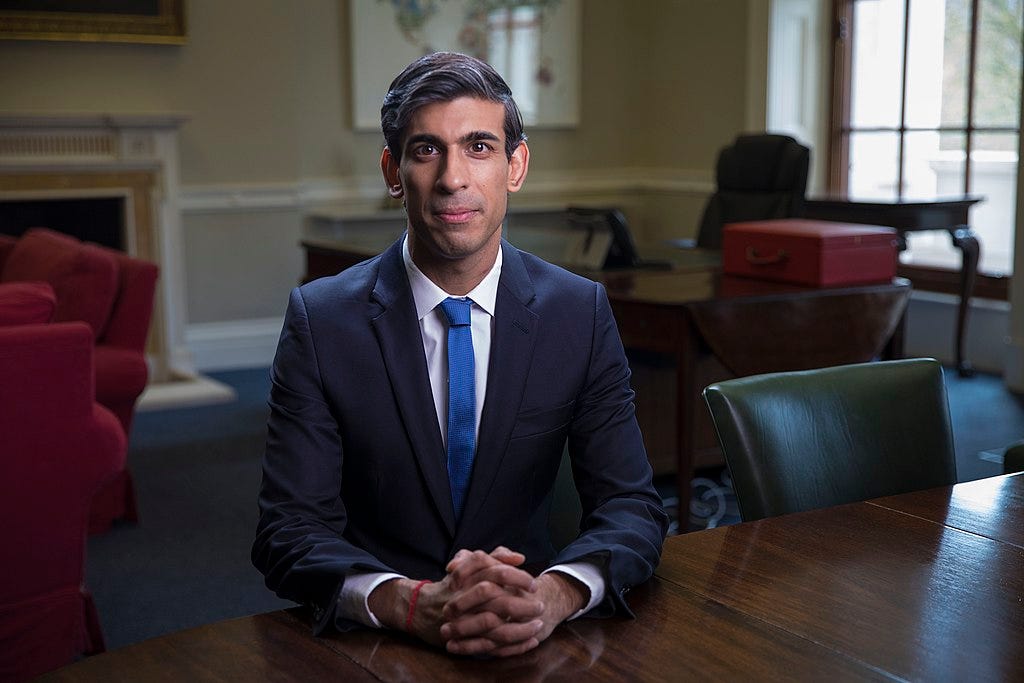
Similarly, Sunak promised that while the aim is to switch from fossil fuel boilers to heat pumps for home heating, and there will be subsidies for this, no one will be forced to do so. "We'll never force anyone to rip out their existing boiler and replace it with a heat pump," he assured.
Sunak also promised to abandon policies that force landlords to improve the energy efficiency of their homes. Instead, such works will simply be encouraged. For example, anyone who rents out property can breathe a sigh of relief. Under the old policy, from 2025 there should have been a regime whereby new tenancies would only be allowed for houses with an Energy Performance Certificate of at least a C, and from 2028 this would apply to all existing tenancies. Now it will not.
However, the country's target of achieving climate neutrality or net zero by 2050 was maintained. In a clip uploaded to his account on social media platform X, Sunak said he was committed to this target, but no politician had the courage to look people in the eye and say what this really involves. He pledged to change this.
Some commentators believe the policy changes are positive in the eyes of voters and could secure Sunak and the Conservatives a victory in next May's elections.
British parliamentary committee calls for Russell Brand to be demonetised
A major sex scandal broke in the British media last Saturday. The Sunday Times, The Times, and Channel 4's Dispatches jointly reported allegations made by four women against Russell Brand, a well-known comedian, former TV presenter, and Hollywood comedy actor. The anonymous women accused him of sexual harassment and even rape. The story has been in the spotlight in the British press all week and new allegations have emerged. Brand himself, however, posted a video on YouTube and Rumble immediately after the scandal broke to deny the allegations.
Of course, it is important that such serious allegations are investigated and the truth revealed. If the allegations have merit, they must be heard in court.
On the other hand, the story is also a good example of the ruthless cancellation culture regarding Brand's ability to continue earning a living. Although Brand still does gigs as a comedian, his main outlet and source of income is by now his production at video-sharing platforms such as YouTube and Rumble. On these platforms, he does live broadcasts, interviews guests, and publishes personal commentaries critical of both the establishment and the mainstream press. To date, his following on these channels has grown into the millions. He currently has 6.64 million followers on YouTube and 1.43 million on Rumble. Although Brand's video production and messages are in no way directly related to his scandal, YouTube has decided that Brand will no longer be paid out the advertising revenue from his YouTube channel. This is not a small amount of money, as it is estimated that Brand could have earned between £2,000 and £4,000 (€2,300 and €4,600) from each of his videos.
This is not directly related to his current earnings, but BBC, Channel 4, and Comedy Central have also started to remove his past programmes from their online archives.
However, the Rumble platform, unlike YouTube, has no plans to attack Brand's ad inventory. This means they are now under pressure in turn. Caroline Dinenage, head of the Culture, Media and Sport Committee at the UK Parliament has written to Rumble's chairman Chris Pavlovski, asking in a demanding tone what the video platform intends to do about Brand. Dinenage explained that Brand had also used the Rumble medium to respond to the story that had accused him. While she claims to understand that Rumble is not the author of the content, she expressed concern about the possibility of Brand making money from content production on the platform. "If so, we would like to know whether Rumble intends to join YouTube in suspending Mr Brand's ability to earn money on the platform," Dinenage inquired.
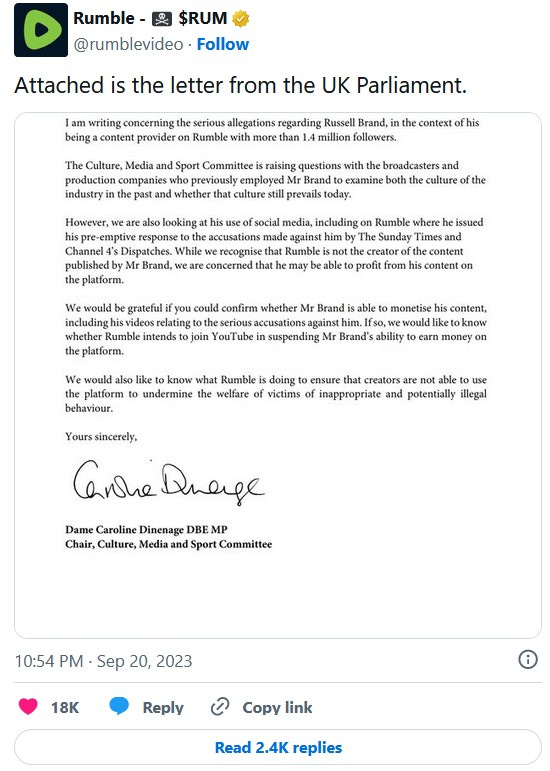
Rumble then disclosed the letter from the Committee, as well as Rumble CEO Pavlovski's response to it. Pavlovski called the Committee's letter "extremely disturbing". "Rumble deplores sexual assault, rape, and all serious crimes, and believes that both alleged victims and the accused are entitled to a full and serious investigation," Pavlovski stated. Commenting on YouTube's decision to revoke Brand's ability to monetize, Pavlovski said they stand for a different set of values on the Rumble platform. "We have devoted ourselves to the vital cause of defending a free internet – meaning an internet where no one arbitrarily dictates which ideas can or cannot be heard, or which citizens may or may not be entitled to a platform," he explained.
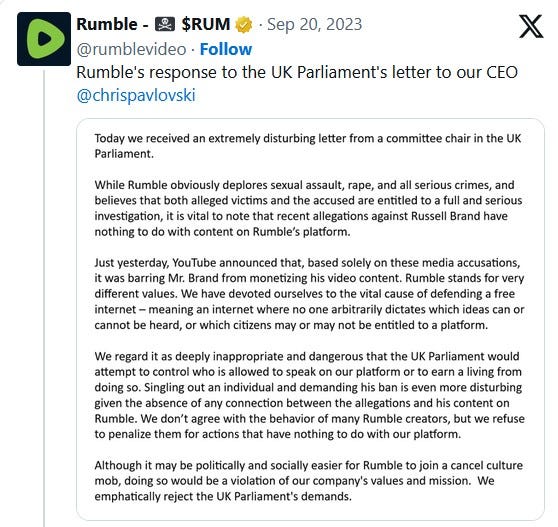
"We regard it as deeply inappropriate and dangerous that the UK Parliament would attempt to control who is allowed to speak on our platform or to earn a living from doing so. Singling out an individual and demanding his ban is even more disturbing given the absence of any connection between the allegations and his content on Rumble. We don't agree with the behavior of many Rumble creators, but we refuse to penalize them for actions that have nothing to do with our platform," Pavlovski wrote.
The US government is allocating millions of dollars to fight "misinformation"
Since the beginning of September, the National Science Foundation (NSF) and the State Department of the US President Joe Biden's administration have provided more than four million dollars (€3.76 million) to support programmes, studies, and other initiatives that target the spread of "misinformation", according to Reclaim The Net.
Two grants totalling $730,017 (€686,215) were awarded to the Research Foundation for the State University of New York and the Trustees of Boston University for a joint research programme to develop a platform to "help identify and mitigate information manipulation (misinformation and dis-information)".
Two grants totalling $547 555 (€686 215) went to the University of Florida and the University of North Carolina at Charlotte as part of a collaborative programme involving the Poynter Institute, a fact-checking organisation that certifies other Facebook "fact-checkers" through its international fact-checking network and receives funding from Big Tech. The description of the project that received the money states that "combating misinformation in the digital age has been a challenging subject with significant social implications” and describes misinformation as “a serious threat.”
Two grants totalling $600,000 (€564,000) were awarded to a joint research programme between the University of Rochester and Indiana University, which aims to increase the effectiveness of artificial intelligence in a variety of areas, including "identifying misinformation on social media.”
There are many more grant decisions listed, including money paid to NGOs in Albania, Paraguay, Nepal, etc., to combat 'misinformation'.
At the same time, the US government itself, under the guise of fighting misinformation, has demanded that social media companies to censor information that is truthful but deemed inappropriate by the authorities. This has particularly been the case in recent years with posts relating to Covid and criticising government policies related to it or talking about the ineffectiveness and dangers of coronavirus vaccines as an example. But other topics have also been censored, such as those concerning the corrupt business practices of President Biden's son Hunter Biden, whose deals are also directly linked to the President.
The censorship situation has been so bad that U.S. Federal Judge Terry A. Doughty issued an injunction in early July banning government agencies and officials from interacting with social media companies, saying the government has assumed a role akin to an Orwellian "Ministry of Truth". The Court of Appeals now confirmed in September that the government had indeed acted improperly in restricting freedom of expression, but still relaxed the ban slightly. The case has now reached the US Supreme Court.
Research: the more you know about the environment, the less anxious you are about climate change
A study published in March this year hypothesised that general knowledge of the environment and climate is inversely related to the anxiety that talking about climate change causes in people. In other words, it tested whether more knowledge leads to more or less anxiety.
To this end, data was collected in Germany from 2066 participants in the study, of whom about half were men and half were women. The average age of the participants was 47.07 years. 43.47% of the participants had a higher education. Participants were given a knowledge test and asked to fill in a questionnaire assessing their level of anxiety about climate change – for example, on a 7-point scale, respondents had to rate whether thinking about climate change made them have difficulties concentrating, or feel like crying, etc.
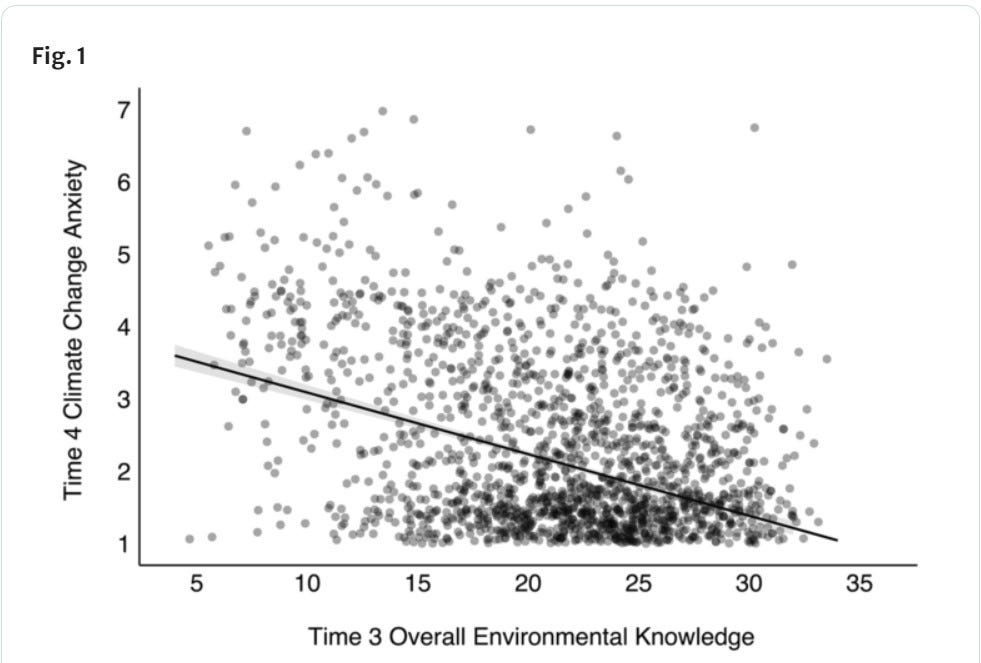
The results showed that general environmental and climate-specific knowledge were negatively associated with climate change anxiety, study authors Hannes Zacher and Cort W. Rudolph stated. Put simply, this means that a better understanding of climate and the environment also ensures lower feelings of anxiety about climate change. "The results of this study add to the growing body of evidence that higher domain-specific knowledge is associated with lower domain-associated anxiety," concluded the study authors. "In terms of practical implications, the main finding that environmental knowledge is negatively related to climate change anxiety suggests that efforts to improve environmental knowledge, for instance through educational and training interventions, may help reduce such anxiety," they wrote.
Rupert Murdoch warns against censorship
Australian-born media magnate Rupert Murdoch has announced that he will step down from running his businesses in mid-November. Murdoch has been building his media empire, News Corp., for almost 70 years, which includes several newspapers, TV channels, publishing houses, online platforms, film companies, and other ventures in various countries. In the United States, for example, Fox News and The Wall Street Journal are very influential, while in the UK The Sun and other outlets. Rupert Murdoch hands over the reins to his son Lachlan Murdoch.
In his statement, Murdoch wrote that the business was in robust health and that he was optimistic about the future of the company. However, in his short letter, he also drew attention to something much more important that deserves more discussion and focus. "My father firmly believed in freedom, and Lachlan is absolutely committed to the cause,” Murdoch wrote. “Self-serving bureaucracies are seeking to silence those who would question their provenance and purpose. Elites have open contempt for those who are not members of their rarefied class. Most of the media is in cahoots with those elites, peddling political narratives rather than pursuing the truth,” he added.
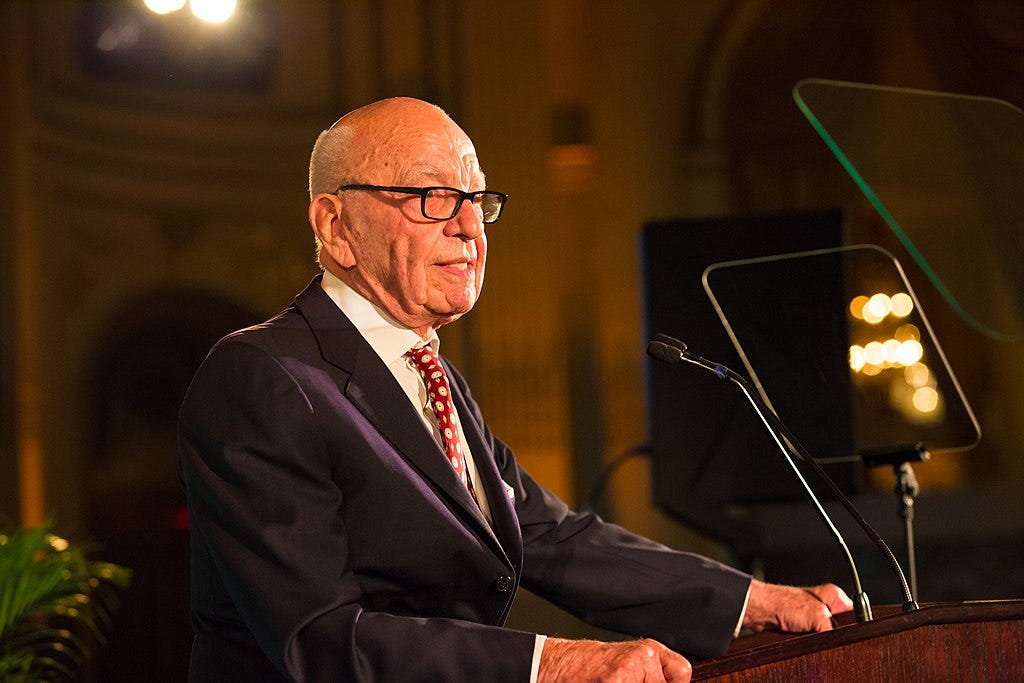
Surely, one might ask, recalling the various scandals involving Murdoch himself, is he not talking about himself? But as to the substance of the message, it's pretty hard to argue with the old man.





Great news summary (the summary is great I mean, not the news...). Thank you!
"Research: the more you know about the environment, the less anxious you are about climate change"
Thank you for putting the reference in. I did look at the full paper, and although the conclusion is mathematically correct, there is an association of knowledge with less anxiety, in practice, it is meaningless. The scattergram of the graph of knowledge against anxiety is essentially random. There is a weak correlation line that can be drawn mathematically, but in practice, there is no meaningful relationship. There is an implled conclusion, that better knowledge means less anxiety, that everything is therefore all right, nothing to worry about.